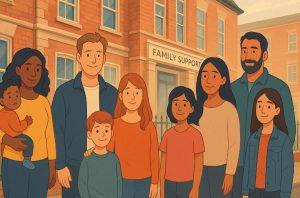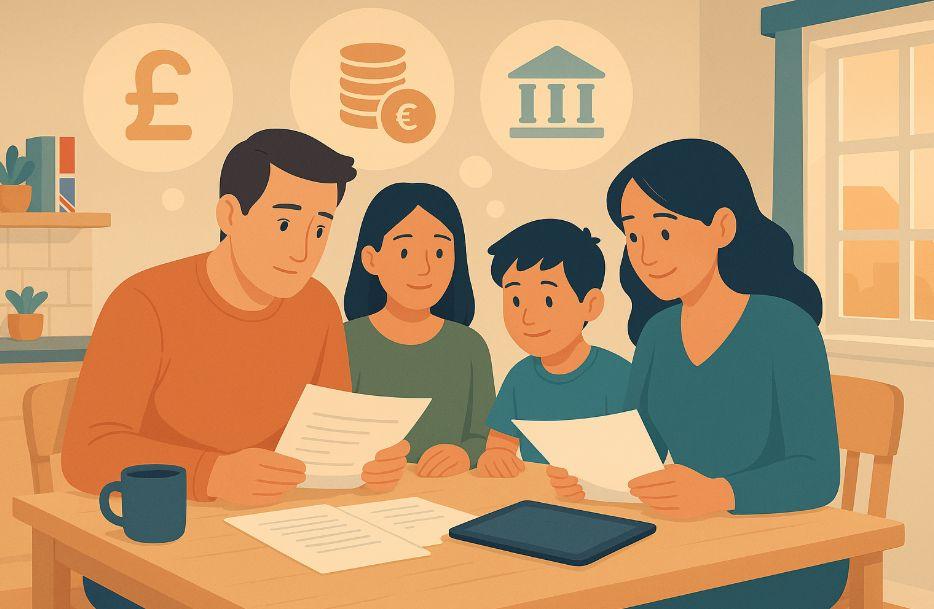Navigating the UK benefits system can often feel like walking through a maze, especially when it comes to understanding financial support available for families. A question that frequently arises is: Is Child Tax Credit the same as Child Benefit?
Despite both providing aid to families raising children, these two schemes serve different purposes, follow different rules, and have distinct eligibility requirements.
This blog explores the similarities, differences, and recent changes surrounding Child Benefit and Child Tax Credit, especially in the context of their role in London and the wider UK.
Who is Eligible for Child Benefit in the UK?

Child Benefit is a universal payment designed to help parents or guardians with the cost of raising children. It is administered by HMRC and is available to most families, regardless of income. As long as someone is responsible for a child under 16 or under 20 if they’re in full-time education or approved training they can usually claim Child Benefit.
Only one person can claim for each child, but there is no limit to how many children a person can claim for. It’s paid either weekly or monthly, depending on your preferences.
While most people receive the full benefit, individuals with an income above £50,000 may need to pay some or all of it back through the High Income Child Benefit Charge (HICBC).
In 2025, the rate for the first child is £25.60 per week, and £16.95 for each additional child. These figures are reviewed annually and are generally adjusted in line with inflation.
How Does Child Tax Credit Work in the UK?
Child Tax Credit was introduced to provide additional financial support for families on low incomes, taking into account the number of children and other family circumstances. It differs from Child Benefit in that it is means-tested, meaning your household income determines whether you qualify and how much you receive.
The credit includes basic payments for each child, and additional amounts for children with disabilities. However, Child Tax Credit is no longer open to new applicants. The UK government has been gradually replacing it with Universal Credit, a single monthly payment that combines multiple benefits, including Child Tax Credit and Working Tax Credit.
Existing claimants can continue receiving it, but any major change in circumstances could trigger a switch to Universal Credit. This includes changes in employment, living arrangements, or family size.
What Are the Main Differences Between Child Benefit and Child Tax Credit?
While both benefits are meant to assist families with the financial costs of raising children, they function quite differently.
Child Benefit is a non-means-tested benefit that’s generally available to all qualifying families. It’s a flat rate paid per child and not influenced by the claimant’s income although higher earners may need to repay it through the tax system.
In contrast, Child Tax Credit is income-based, targeted at families who earn below a certain threshold. It’s more complex, with payments tailored to individual circumstances, including household income, number of children, and whether any of the children have disabilities.
Another important distinction is the status of each benefit. Child Benefit remains active and open for new claims. Child Tax Credit, however, has been closed to new applicants and is being phased out in favour of Universal Credit.
Has Child Tax Credit Been Replaced by Universal Credit?

Yes, for the most part. Child Tax Credit is no longer available for new claims. Instead, families are advised to apply for Universal Credit, which consolidates several older benefits into one streamlined monthly payment.
Universal Credit now includes Child Tax Credit, Working Tax Credit, Income Support, Housing Benefit, and certain other benefits. The transition aims to simplify the system and reduce administrative errors, although there has been criticism regarding delays and reduced payments for some claimants.
Existing Child Tax Credit recipients can continue to receive payments for now, but HMRC is gradually migrating them to Universal Credit. This process is ongoing and affects families differently based on their individual circumstances.
Can You Receive Both Child Benefit and Child Tax Credit?
Yes, it is entirely possible for a family to receive both Child Benefit and Child Tax Credit, and in fact, many did prior to the rollout of Universal Credit. This is because the two benefits are independent of each other, designed to support families in different ways.
Child Benefit is a basic entitlement that most families can receive, whereas Child Tax Credit was designed as a top-up for lower-income households. Claiming both allowed families to maximise their financial support.
Today, families who are new to the system would receive Universal Credit instead of Child Tax Credit but can still claim Child Benefit separately.
How Can You Apply for Child Benefit and Child Tax Credit?
Applying for Child Benefit involves completing a CH2 form, available through HMRC. This form is submitted by post and must be accompanied by the child’s birth certificate. Parents are encouraged to apply as soon as their child is born or comes into their care, as payments can only be backdated for up to three months.
For Child Tax Credit, applications are no longer accepted from new claimants. Those already receiving it can continue their claims, but only under specific circumstances.
If your household has a significant change like a new job or a move you may be required to transition to Universal Credit, which can be applied for online through the Department for Work and Pensions (DWP).
How Have UK Family Tax Benefits Changed in 2025?

Several updates have come into effect in 2025 that impact how family benefits work in the UK. The government has increased the rates for Child Benefit in line with inflation, which is a welcome relief for many households coping with the rising cost of living in cities like London.
Additionally, the Universal Credit system has been streamlined, with improved online services and updated thresholds for income-based assessments. The High Income Child Benefit Charge thresholds have also been revised, allowing more families to retain a larger portion of their benefits without paying additional tax.
These changes reflect the government’s ongoing efforts to simplify the welfare system and make it more responsive to current economic conditions.
What Are the Common Misconceptions About Child Tax Credit and Child Benefit?
A widespread misconception is that Child Tax Credit and Child Benefit are essentially the same thing. While they may seem similar on the surface, they are different in both structure and purpose.
Another common misunderstanding is that high earners are not allowed to claim Child Benefit. In truth, they can still claim it, but may have to repay it through the HICBC if their income exceeds £50,000.
Many people also believe that Child Tax Credit is still widely available, when in fact, it has been replaced for most families by Universal Credit. These misconceptions can lead to missed entitlements or financial mismanagement, which is why it’s essential to stay informed.
Why is It Important to Understand the Difference Between These Two Benefits?
Understanding the distinction between Child Tax Credit and Child Benefit is crucial for effective financial planning, especially in cities like London where living costs are significantly higher. Claiming the wrong benefit or missing out on one altogether can result in lost income or even penalties from HMRC.
Knowing how each benefit works allows families to make the most of government support, budget accurately, and avoid unnecessary stress. For professionals offering financial advice or parents planning maternity leave, this knowledge is invaluable.
Conclusion
The answer is clear: no, they are not the same. Child Benefit remains a universal, non-means-tested benefit accessible to most families. Child Tax Credit, by contrast, was a means-tested support for lower-income households and is now largely replaced by Universal Credit.
Understanding this difference is vital for families trying to navigate the benefits landscape in the UK. It ensures they receive the correct entitlements and make informed decisions about their finances.
Sources
FAQs About Child Benefit and Child Tax Credit
Can I still apply for Child Tax Credit in 2025?
No. It is now replaced by Universal Credit for all new applicants.
Do both parents need to apply for Child Benefit?
Only one parent or guardian can claim Child Benefit for each child.
What happens if I earn over £50,000 and claim Child Benefit?
You may have to pay the High Income Child Benefit Charge through your Self Assessment tax return.
Is Universal Credit better than Child Tax Credit?
Universal Credit simplifies the system but may provide less money for some households compared to legacy benefits.
Can non-UK citizens claim Child Benefit?
Yes, but they must meet certain residency and immigration conditions.
How do I report a change that affects my Child Tax Credit?
You can report changes through HMRC’s online services or helpline to avoid incorrect payments.
Is Child Benefit taxable?
Not directly, but high earners may need to repay it via the HICBC.









Leave feedback about this